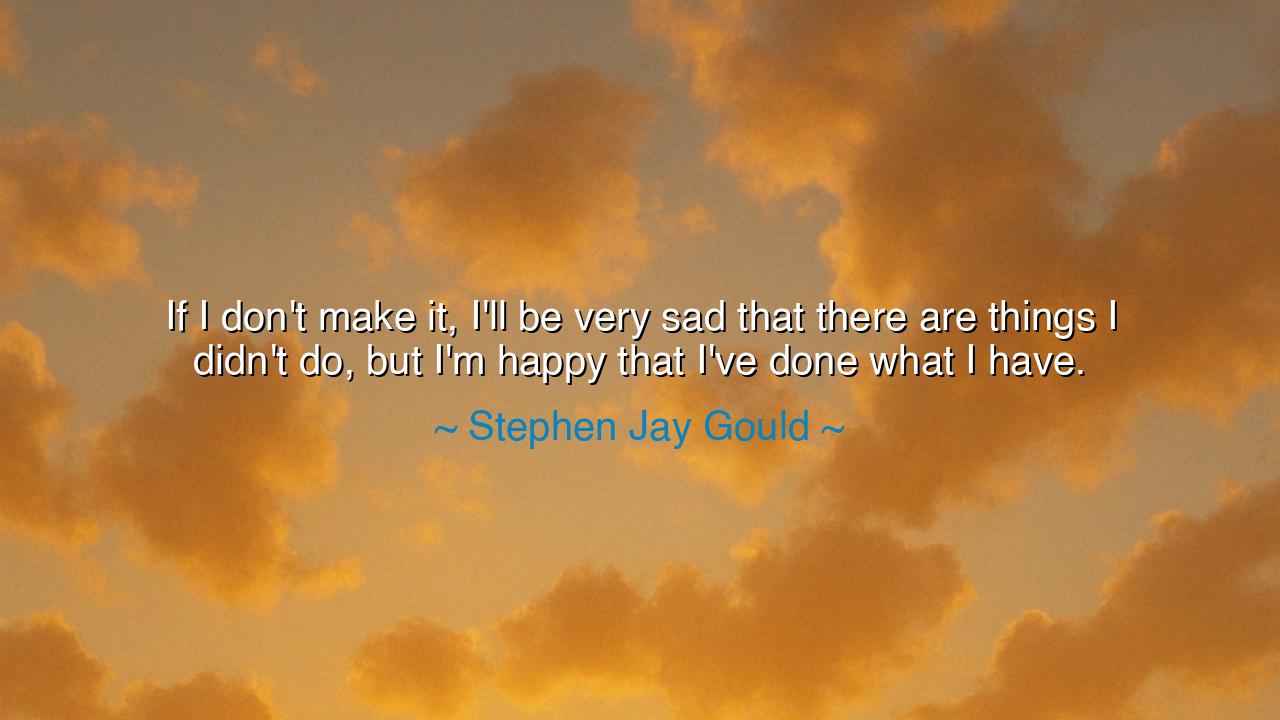
If I don't make it, I'll be very sad that there are things I
If I don't make it, I'll be very sad that there are things I didn't do, but I'm happy that I've done what I have.






“If I don’t make it, I’ll be very sad that there are things I didn’t do, but I’m happy that I’ve done what I have.” — thus spoke Stephen Jay Gould, a man who stared into the abyss of mortality and found not only fear, but gratitude. His words are the cry of one who knows life is brief, uncertain, and fragile, yet still a gift worth treasuring. In them we hear the wisdom of the ancients: that though the span of years may be short, a life filled with purpose is greater than a long life wasted.
The phrase “if I don’t make it” reveals the shadow of death looming over him. Gould faced illness, the uncertainty of survival, and the possibility that his time was nearly at an end. To admit sadness at what might remain undone is to speak honestly, for regret is the companion of every mortal heart. Yet he refuses to let regret become his master. Instead, he turns his gaze toward the light, declaring himself happy for what has been accomplished. This balance of sorrow and joy is the very art of living: to acknowledge what is lost, but to cherish what remains.
Consider the tale of Alexander the Great, who died at the age of thirty-two. His empire stretched from Greece to India, yet he left many ambitions unfulfilled. He had dreamed of conquering Arabia, of reaching the farthest oceans, of shaping the world even further. And yet, in his short life, he achieved more than many who lived twice as long. History does not remember Alexander for what he failed to do, but for what he did in his fleeting years. Gould’s reflection is of the same spirit: to be grateful for what has been achieved, even while recognizing the horizon that remains beyond reach.
The origin of Gould’s words lies in the universal human struggle with mortality. Each person lives under the same law: time is limited, and no one completes every dream. To be consumed by this truth is despair, but to accept it with dignity is wisdom. Gould teaches us that it is possible to face death with honesty and still withhold bitterness. The key lies in gratitude—choosing to see not only what is absent, but also what is present, not only the unfinished chapters, but the ones already written.
This reflection carries also the heroic challenge of presence. Too many spend their lives always reaching forward, believing happiness lies only in the future, in the next conquest, in the next victory. But when the end approaches, it is not the distant horizon that comforts the heart—it is the memory of the moments already lived, the deeds already done, the kindness already given. To be happy with what you have done is to meet death not as a thief but as a companion who arrives after the feast, when the table has already been filled with meaning.
The lesson is clear: live so that you may face the end without despair. Accept that there will always be things undone, roads untraveled, words unsaid. This is the way of all humanity. What matters is not completing every dream, but living with enough courage and love that even an unfinished life shines as complete. Do not waste your days waiting for the perfect moment—act now, love now, create now. Let each day leave behind a trace of meaning so that, whether short or long, your story will be rich.
Practical action follows: pause often and take inventory of your life. Ask not only what you long to do, but what you have already achieved and can be grateful for. Keep a record of your blessings, your deeds, your joys. Let regret be the spark that drives you forward, but let gratitude be the anchor that steadies you. If you have dreams, pursue them today, for tomorrow is never promised. If you have loved ones, cherish them now, for they are the true measure of wealth.
Thus Stephen Jay Gould’s words remain a teaching for the ages: to be sad at what cannot be finished, yet to be happy for what has been lived. In this balance lies the art of wisdom. We cannot command the length of our days, but we can shape their depth. And if we live deeply, with gratitude and courage, then when the end comes, we may leave not in despair, but with peace, knowing that what we have done is enough.






AAdministratorAdministrator
Welcome, honored guests. Please leave a comment, we will respond soon